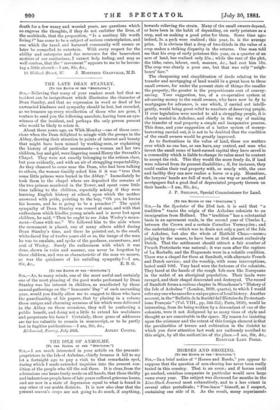THE LATE DEAN STANLEY.
(To THE EDITOR OF THE SPECTATOR:) SIR,—Believing that many of your readers must feel that no incident can be insignificant which illustrates the character of Dean Stanley, and that no expression in word or deed of his unwearied kindness and sympathy should be lost, but recorded, as we treasure up every recollection of those who are gone, I venture to send you the following anecdote, having been an eye- witness of the incident, and perhaps the only person present who would be likely to relate it.
About three years ago, on Whit-Monday—one of those occa- sions when the Dean delighted to mingle with the groups in the Abbey, drawing their attention to points of interest and beauty that might have been missed by working-men, or explaining the history of particular monuments—a woman and her two children, boy and girl, were lingering round Henry the Seventh's Chapel. They were not exactly belonging to the artisan class, but poor evidently, and with an air of struggling respectability. As they chanced to come near the Dean, who had been talking to others, the woman timidly asked him if it was "true that some little princes were buried in the Abbey." Immediately he took them to the chapel where are deposited the remains of the two princes murdered in the Tower, and spent some little time talking to the children, especially asking if they were learning English history at school, upon which the mother answered with pride, pointing to the boy, "Oh yes, he learns his lessons, and he is going to be a preacher !" The quick sympathy of Dean Stanley was roused at once, and with that enthusiasm which kindles young minds and is never lost upon children, he said, "Then he ought to see John Wesley's monu- ment—Come with me." We followed him to the aisle where the monument is placed, one of many others added during Dean Stanley's time, and there he pointed out, to the small, white-faced boy of twelve years old or so, the image of the man he was to emulate, and spoke of the goodness, earnestness, and zeal of Wesley. Surely the enthusiasm with which it was done, shown in voice and manner, can never be forgotten by those children, and was as characteristic of the man we mourn, as was the quickness of his unfailing sympathy P—I am,


































 Previous page
Previous page